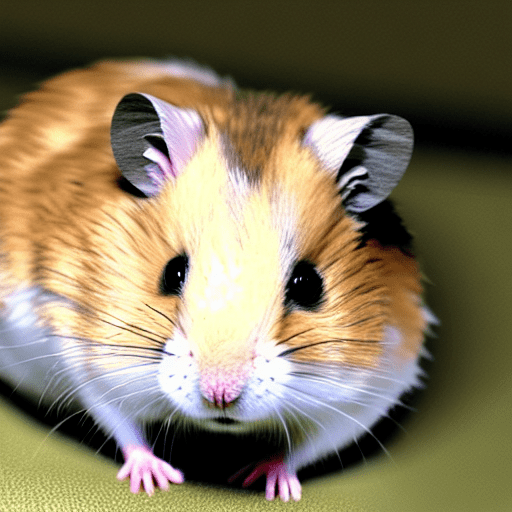Your hamster might not be eating due to various reasons, such as dental issues, stress, illness, or a change in its environment.
Importance Of Proper Nutrition For Hamsters
Proper nutrition is essential for the overall health and well-being of hamsters. A balanced diet plays a crucial role in ensuring that your hamster stays healthy and happy. Hamsters require a combination of different nutrients, including proteins, carbohydrates, fats, vitamins, and minerals, to meet their specific dietary needs.
A balanced diet is vital for hamsters due to its impact on their overall health. When hamsters are not provided with a nutritious diet, it can lead to various health issues. Inadequate nutrition can weaken their immune system, making them more prone to infections and diseases. It can also result in poor coat condition, stunted growth, and dental problems.
It is important to note that every hamster has individual dietary requirements, and their nutritional needs may vary depending on their age, breed, and health condition. Consulting a veterinarian or a pet nutritionist can help you create a suitable diet plan for your hamster to ensure they receive all the necessary nutrients for optimal health.
Signs That Indicate Your Hamster Is Not Eating Well
Loss of appetite in hamsters can be a concerning issue for pet owners. It is important to recognize the signs and take appropriate actions to ensure their well-being. One clear indication that your hamster is not eating well is when you notice a lack of interest in food. This can be observed if they consistently ignore their food or show no excitement during meal times.
Weight loss is another visible sign of a hamster not eating properly. Regularly monitor your hamster’s weight and look out for any noticeable changes. If you notice a significant drop in weight, it could be an indication of an underlying health issue.
Observing changes in behavior can also help identify abnormal eating habits. Keep an eye out for any unusual behaviors such as prolonged periods of lethargy, excessive drinking, or changes in bathroom habits. These changes in behavior can be an indication that your hamster is not getting the necessary nutrition.
Common Reasons Why Hamsters Stop Eating
It can be concerning when your hamster is not eating. There are several common reasons why hamsters may stop eating, and it’s important to understand them.
| Dental Problems: |
Hamsters’ eating abilities can be affected by dental issues. Overgrown teeth, tooth infections, or misaligned teeth can make it difficult or painful for hamsters to chew and eat properly. |
| Illness or Disease: |
Sickness can significantly impact a hamster’s appetite. Various illnesses, such as respiratory infections, gastrointestinal issues, or infections, can lead to a loss of appetite. |
| Stress or Anxiety: |
Stressful situations, changes in environment, or the presence of predators can cause hamsters to become anxious and stop eating. High-stress levels can suppress their appetite. |
If you notice that your hamster is not eating, it’s important to monitor their behavior and consult a veterinarian if the issue persists. Identifying and addressing the underlying cause can help ensure your hamster’s health and well-being.
Creating A Well-balanced Hamster Diet
Creating a well-balanced hamster diet is essential for ensuring your furry friend’s good health. Hamsters have specific dietary requirements that must be met to keep them happy and thriving. Understanding these requirements is key to addressing issues such as lack of appetite.
Hamsters need a mix of seeds, grains, and pellets to provide them with the necessary nutrients. This combination offers a good balance of protein, carbohydrates, and fats.
It’s important to choose high-quality ingredients to ensure your hamster is getting the best nutrition possible.
In addition to seeds, grains, and pellets, it’s crucial to incorporate fresh fruits and vegetables into your hamster’s diet. These add variety and
provide essential vitamins and minerals. Make sure to introduce new foods gradually to avoid digestive upset.
By providing the right mix of seeds, grains, and pellets, as well as incorporating fresh fruits and vegetables, you can promote a well-rounded diet for your hamster. Remember to
consult with a veterinarian for specific dietary recommendations based on your hamster’s age, breed, and overall health.
Ensuring Proper Feeding Habits For Your Hamster
Having a hamster that is not eating can be a cause for concern for pet owners. It is important to ensure proper feeding habits for your hamster in order to maintain its health and well-being.
One key aspect of hamster nutrition is establishing a routine feeding schedule. Hamsters thrive on consistency, so having a set time for feeding can help them feel secure and comfortable in their environment. By following a schedule, your hamster will come to expect and anticipate their meals, which can promote regular eating habits.
Another important factor to consider is portion control. It is crucial to offer your hamster the appropriate amount of food. Overfeeding can lead to obesity and related health problems, while underfeeding can result in malnutrition. Consult with your veterinarian or do research to determine the ideal portion sizes for your hamster based on its breed, age, and activity level.
| Important Tips for Feeding Your Hamster |
| Provide a variety of fresh and healthy foods to ensure a well-rounded diet. |
| Introduce new foods gradually, giving your hamster time to adjust to different flavors and textures. |
| Always have fresh water available for your hamster. Water plays a vital role in their digestion and overall well-being. |
In conclusion, establishing a routine feeding schedule and practicing portion control are essential in ensuring proper feeding habits for your hamster. By incorporating these practices into your hamster’s care routine, you can promote a healthy and thriving pet.
Encouraging Your Hamster To Eat
When it comes to hamsters not eating, it is important to address the issue promptly as a lack of appetite can indicate an underlying health problem. Encouraging your hamster to eat can be achieved through providing a stimulating environment that includes enrichment activities. By offering your hamster treats and supplements, you can boost their nutritional intake and entice them to eat. Monitoring your hamster’s eating habits is crucial in identifying any changes or concerns. Keeping track of their appetite can help you gauge their overall health and well-being. It is essential to pay attention to any potential signs of illness, such as weight loss, lethargy, or changes in behavior. If your hamster’s appetite does not improve despite your efforts, it is advisable to consult a veterinarian to ensure their well-being.
Frequently Asked Questions For Why is my Hamster Not Eating
How Do I Get My Hamster To Eat?
To get your hamster to eat, offer a balanced and varied diet with fresh fruits, vegetables, and high-quality hamster pellets. Ensure a clean and comfortable environment and provide fresh water daily. Monitor your hamster’s appetite and consult a veterinarian if there are any concerns.
What Are The Symptoms Of A Sick Hamster?
Common symptoms of a sick hamster include loss of appetite, lethargy, weight loss, diarrhea, and changes in behavior or appearance. Other signs may include discharge from the eyes or nose, difficulty breathing, and hair loss. It is important to consult a veterinarian for proper diagnosis and treatment.
How Long Can A Hamster Live Without Food?
A hamster can survive without food for about 2-3 days, but it is not recommended. Hamsters need a consistent supply of nutrition to stay healthy and avoid health issues. Always make sure your hamster has access to fresh food and water.
Why Is My Hamster Not Moving Or Eating?
Possible answer: A hamster not moving or eating could be a sign of illness or stress. It’s important to monitor their behavior and consult a veterinarian for proper diagnosis and treatment.
Conclusion
A hamster not eating can be a cause of concern for pet owners. The reasons behind this behavior can vary from dental issues to emotional stress. It is important to assess their environment, diet, and health to identify potential issues.
If your hamster continues to have a poor appetite, it is advisable to seek veterinary help for a proper diagnosis and treatment. Remember, a healthy hamster is a happy hamster.

